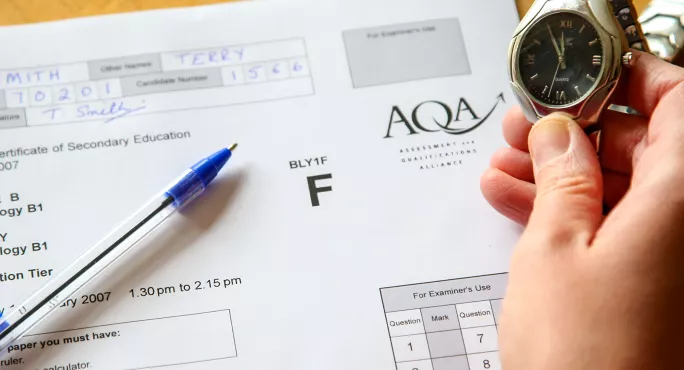It’s one of the biggest exam boards in the UK, so there won’t be many students and teachers in the country who haven’t heard of AQA. From GCSEs to A levels, you’ll find its logo staring out from an exam paper somewhere near you.
But what does AQA do, who runs it and who makes sure it’s doing its incredibly important job properly?
Here, we give an overview of everything AQA.
What is AQA?
AQA (formerly the Assessment and Qualifications Alliance) is one of five main exam boards in the UK and one of the largest. A total of 92 per cent of UK schools take AQA qualifications of some sort and 1.4 million students sat its qualifications last year.
A registered charity led by CEO Colin Hughes, its main job is to set and mark examinations and assessments, determine grades and deal with requests for re-marks. For each exam or assessment, it publishes a specification that clearly outlines what candidates need to know and how exactly their knowledge will be tested.
To do all this, AQA uses around 30,000 teachers, lecturers, subject experts and academics, who help to design its qualifications and to set and mark exams.
AQA says it also works “collaboratively” with teachers to create resources they can use in the classroom. Schools can choose which exam boards they use for different subjects, depending on the specifications, modes of assessment and other factors.
All of AQA’s work is overseen by the exams watchdog Ofqual.
How long has it been around?
The history of AQA dates back to 1903 when the universities of Manchester, Leeds and Liverpool established the Joint Matriculation Board (JMB) and became public exam providers.
Later, in 1953, The Associated Examining Board (AEB) was established to provide the new General Certificate of Education (GCE) to all secondary schools - an exam that would cater for a wider range of subjects and abilities.
Over the years, a series of mergers between these and other bodies led to the establishment of the Assessment and Qualifications Alliance in 2000, although it now goes by the acronym AQA.
AQA says it tries to remain true to the JMB’s founding commitment to “give all students the opportunity to show what they can do”.
What exams and subjects does AQA cover?
A behemoth in the exams world, AQA says it sets and marks more than half of all GCSE and A-level papers. It also offers project qualifications at levels 1,2 and 3, including the Extended Project Qualification (EPQ) that provides an extension to A-level sixth-form studies.
It also offers Applied General Qualifications in business and science aimed at 16- to 19-year-olds, and Entry Level Certificates in English, maths and science.
For GCSE and A level, AQA offers a huge range of subjects, and it is understood to be the dominant provider for GCSE English qualifications with 596,162 entries for English language alone in 2024.
What has AQA said about digital assessment?
In 2025, in an exclusive interview with Tes, Mr Hughes said that digital exams may not be ready until 2028, and not for a major subject until at least 2035 - five years later than originally planned.
He also backed a gradual move towards using artificial-intelligence cameras to help invigilate GCSE and A-level exams, arguing that schools would benefit from not having to recruit so many invigilators.
Has AQA been involved in any recent controversy?
As a dominant exam board, it’s perhaps inevitable that AQA has been caught up in some controversies over the years.
For example, in 2024 the Institute of Physics said that one AQA A-level physics paper was “unreasonably difficult”.
Teachers also criticised AQA in 2024 over an “obscure” English literature GCSE extract from Romeo and Juliet, which they said was harder for students to analyse than an extract from Macbeth, another Shakespeare option.
AQA has also been subject to Ofqual rulings affecting all exam boards in recent years, including a decision to be more generous when grading GCSE French, German and computer science.
For the latest education news and analysis delivered directly to your inbox every weekday morning, sign up to the Tes Daily newsletter





